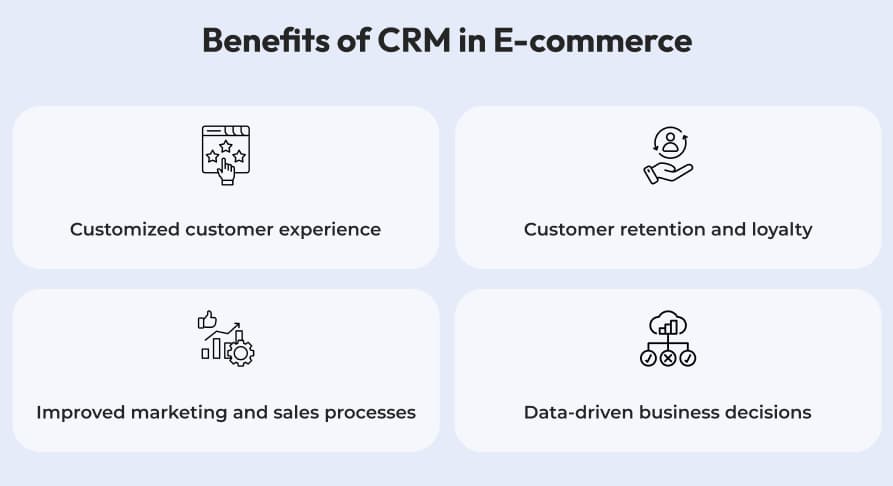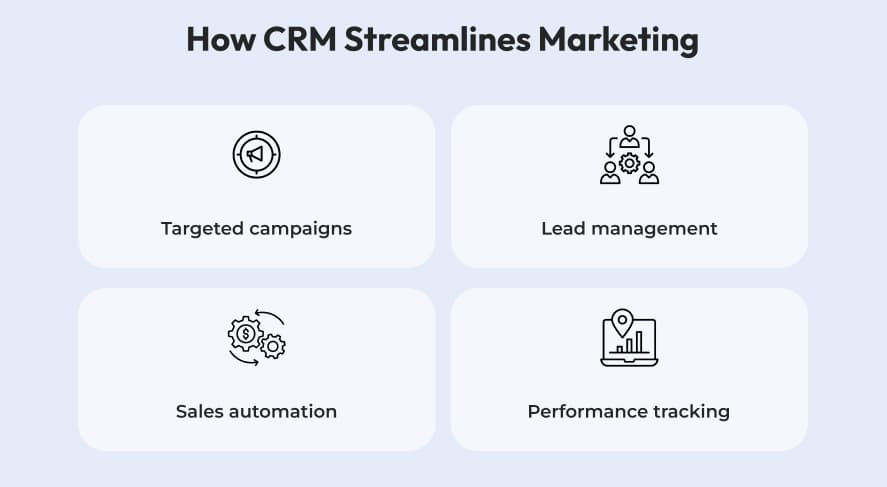In today’s rapidly evolving e-commerce environment, customer trust dictates long-term success. Customer relationship management applications have become vital to manage interactions and monitor key data. Excellent products alone are now not enough to guarantee success. Businesses have to implement CRM solutions for personalized marketing, communication, and decision-making on the basis of data. It logs all the customer interactions, making it easier for brands to compete.
The article will cover the top CRM benefits for eCommerce and how these can lead to success in a competitive marketplace. Realizing the value of CRM enables brands to live up to customer expectations and succeed online.

Customized Customer Experience
Today, customers no longer look for products; they look for unique experiences. CRM implementation makes it possible for companies to offer these experiences to customers. CRMs also have the ability to use customer data, such as interests and previous purchases, to offer products and services at the right time with precisely timed marketing campaigns. Personalization plays an important role in engendering relationships between the brands and the consumers, making people feel unique. Through improving user interface and customer relationship management with AI-assisted personalization based on previous views and purchases, companies increase customer satisfaction.
Organizations can utilize email marketing and personalize the content of the emails according to the customers. Using specific consumer information, brands can create emails or promotions that are specific to various groups of customers. Self-service notifications (like order tracking) keep customers informed and engaged. When organizations use CRM solutions that adapt to life events to create tailored touchpoints, they significantly increase satisfaction, improve retention rates, and foster customer loyalty.
Customer Retention and Loyalty
Focusing on acquiring new customers remains significant, but the focus should be on retaining those that you already have. Data indicates that returning customers are likely to spend more and speak highly of your brand while recommending it to others. These relationships in which customers are retained are supported by CRM systems, facilitated by follow-up automations, loyalty rewards, and communications that continue long past the first purchase.
Frequent and meaningful engagement is the way to keep your customers loyal. However, it does go further by automating follow-ups, which means that thank you and reminders can be personally delivered via email. It also facilitates loyalty programs by recording customer purchases, and businesses can construct and integrate reward programs attracted towards boost customer retention. As for re-engagement campaigns, CRM allows brands to find customers who haven’t made recent purchases and leverage data to create offers designed to encourage customers to purchase again. Prioritizing customer retention, in turn, strengthens relationships with the audience. CRM tools allow brands to deliver continuous value and stay top-of-mind among their patrons.
Companies like Cleveroad, with years of experience in CRM software development for eCommerce, help brands design and integrate customer retention tools that combine automation, analytics, and personalization. Their CRM solutions support loyalty programs, targeted marketing, and data-driven engagement strategies, enabling businesses to build lasting customer relationships and achieve sustainable growth.
Improved Marketing and Sales Processes
In the world of eCommerce, the cross-team coordination of the marketing and sales teams to turn leads into paid customers is of utmost importance. A CRM system is the connector to integrate the data, automate tasks, and improve communication. Having all customer data in one place enables teams to reach the right people with the right campaigns, track their responses, and ensure a seamless transition from interest to purchase.

Here is how CRM streamlines marketing and sales processes:
- Targeted campaigns: CRM systems enable businesses to segment customers by behaviors, demographics, and purchase history, which allows marketers to develop highly personalized email campaigns to drive engagement.
- Lead management: The teams can see each lead where it stands in the sales cycle and can reach out to them at the right time so that they don’t miss an opportunity.
- Sales automation: Probably one of the best benefits of Internet marketing on sales automation is that it takes care of paperwork like order confirmation, cart reminders, and follow-up mail itself.
- Performance tracking: By keeping track of key figures such as conversion rates, click-through rates, and overall revenue, a company is able to know how its campaigns are performing and continuously adapt accordingly.
This ultimately benefits eCommerce as a CRM system enables in-sync marketing and sales strategies to function in one easy and seamless experience for customers right from the moment of discovery, all the way through to the final purchase.
Data-Driven Business Decisions
In the age of eCommerce, acting on intuition alone is a thing of the past. The numbers speak for themselves, setting a base for decisions in growth. CRM systems structure the customer data into actionable formats, enabling businesses of all walks to harness real-time insights. Thus, brands can analyze the data related to buying trends and predictions as opposed to speculation, which is based on assumed and approximated conclusions.
CRM systems reveal customer behavior = Purchase history and customer interactions make it easy for the brand to see trends and adjust product offerings and marketing programs. Examine past sales and predict future demand to help companies manage inventories and avoid both shortages and overstock. On the other hand, CRM also allows for performance analysis, which ensures that marketing campaigns and sales efforts are scrutinized and disclosed so brands can base their tactics on cold-hard statistics. Analytics in CRM also allows the making of custom offers or price points to certain user groups and gives a substantial discount or user loyalty programs that will make the maximum impact.
Retailers utilize CRM data to identify ways to grow, streamline business processes, and quickly adapt to changing consumer demand. In this era of competition, one needs trust and accurate information so that they can make decisions that can ensure their success.
Conclusion
In the ultra-competitive eCommerce landscape, a properly utilized CRM system is the only thing that separates ephemeral sales numbers from sustainable success. CRM tools will actually enable businesses to develop a real relationship with customers for much higher retention rates, with custom buying experiences and improved marketing and selling processes. It also enables smarter decision-making — data-driven — all tuned to customer needs and the dynamics of the market.
Ultimately, CRM is about more than just customer database management; it’s about leveraging the information to drive value at every customer lifecycle touchpoint. Whether it’s for setting up processes for efficiency, loyalty management, or optimizing marketing strategies, a CRM system lays the foundation for sustainable business growth. Considering this eCommerce strategy, CRM solutions are not a choice but a must-have for eCommerce success in a world that is constantly updating customer expectations.



